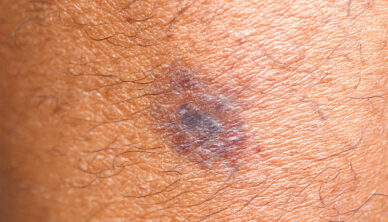Contents
Skin Cancer

Our specialist dermatologists and oncologists provide expert diagnosis and advanced treatment options for all types of skin cancer.
What is Skin Cancer?
Skin cancer occurs when abnormal skin cells grow uncontrollably, often due to excessive UV exposure from the sun or tanning beds. It is the most common type of cancer in the UK, but with early diagnosis and treatment, it is highly treatable.
There are three main types of skin cancer:
- Basal Cell Carcinoma (BCC) – The most common type, slow-growing and rarely spreads.
- Squamous Cell Carcinoma (SCC) – Can grow deeper into the skin and spread if untreated.
- Melanoma – The most serious type, which can spread (metastasize) rapidly if not detected early.
Potential Causes & Risk Factors
- Excessive UV Exposure – Sunlight and tanning beds increase skin cancer risk.
- Fair Skin, Freckles, or Red Hair – More prone to sun damage.
- Frequent Sunburns (Especially in Childhood) – Increases long-term risk.
- Family History of Skin Cancer – Higher risk if relatives have had skin cancer.
- Weakened Immune System – Reduces the body’s ability to fight abnormal cell growth.
- Age & Lifestyle Factors – Skin cancer risk increases with age and prolonged sun exposure.
Signs & Symptoms
Different types of skin cancer have unique symptoms. The ABCDE rule helps identify potential melanomas:
- A – Asymmetry: One half of the mole is different from the other.
- B – Border Irregularity: Edges appear uneven, blurred, or notched.
- C – Color Variation: Multiple shades within a single lesion.
- D – Diameter: Moles larger than 6mm should be checked.
- E – Evolving: Changes in size, shape, color, or texture over time.
Other warning signs include:
- New, changing, or non-healing skin lesions
- A sore that doesn’t heal or bleeds frequently
- A rough, scaly patch of skin that itches or bleeds (SCC)
- A pearly, waxy lump with visible blood vessels (BCC)
If you notice any changes in your skin, seek an expert assessment as early detection significantly improves treatment outcomes.
Diagnosis
- Clinical Skin Examination – A thorough assessment of any suspicious moles or lesions.
- Dermatoscopy – A specialized tool to examine skin growths in detail.
- Skin Biopsy – Removal of a small tissue sample for laboratory analysis.
- Mole Mapping – High-resolution imaging to track changes over time.
- Imaging Tests (CT, MRI, PET Scans) – If skin cancer has spread beyond the skin.
Treatment Options
- Surgical Excision – The most effective treatment for removing cancerous skin growths.
- Mohs Surgery – A precise method for removing cancerous cells layer by layer while preserving healthy skin.
- Cryotherapy (Freezing the Cancer Cells) – Used for small, early-stage skin cancers.
- Radiotherapy & Chemotherapy – Used for advanced or inoperable cases.
- Immunotherapy & Targeted Therapy – New treatments designed for aggressive or metastatic skin cancer.
The best treatment approach depends on the type, size, and stage of the skin cancer.
Monitoring and Follow-Up Care
- Regular Skin Checks – To detect new or recurring skin cancers early.
- Sun Protection Strategies – SPF 30+ sunscreen, protective clothing, and avoiding excessive sun exposure.
- Mole & Skin Monitoring – Early detection can prevent the spread of skin cancer.
- Genetic Testing (If Needed) – For those with a family history of skin cancer.
Continuous dermatological monitoring ensures the best long-term outcomes for patients at risk.
Arranging To Visit A Private GP
If you have any concerns about a mole or skin lesion, then you can make an appointment with one of our private GPs who can refer you to our specialist dermatologists. Appointments are available to everyone and can often be booked for the same day. There is no need to be registered with our The Royal Buckinghamshire Hospital, or live locally.
If you have insurance which covers a GP visit, we can in most cases invoice the insurer directly. Where you are paying directly, the cost for a 30 minute consultation is £100.
Any additional costs will always be discussed. They could apply if you are referred for an MRI scan, or to a consultant, or for other agreed decisions to support your health.
24 March 2025
